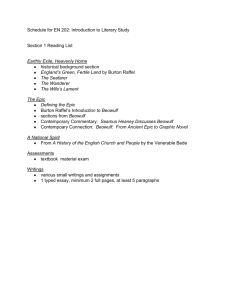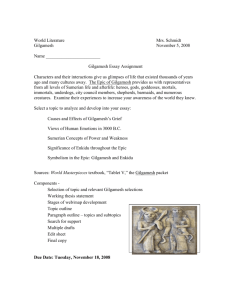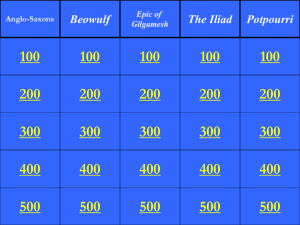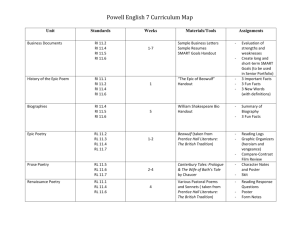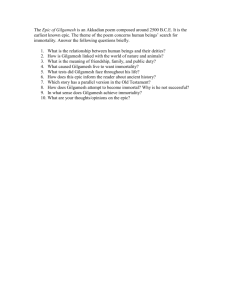Engl 2800 Final Study Guide
advertisement
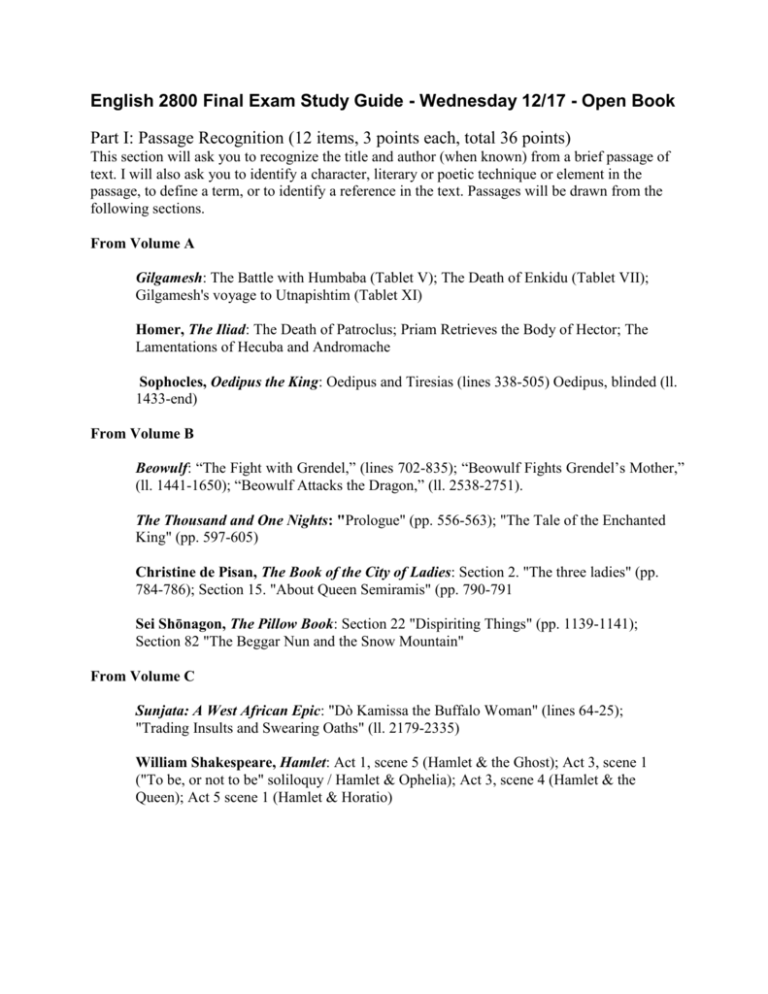
English 2800 Final Exam Study Guide - Wednesday 12/17 - Open Book Part I: Passage Recognition (12 items, 3 points each, total 36 points) This section will ask you to recognize the title and author (when known) from a brief passage of text. I will also ask you to identify a character, literary or poetic technique or element in the passage, to define a term, or to identify a reference in the text. Passages will be drawn from the following sections. From Volume A Gilgamesh: The Battle with Humbaba (Tablet V); The Death of Enkidu (Tablet VII); Gilgamesh's voyage to Utnapishtim (Tablet XI) Homer, The Iliad: The Death of Patroclus; Priam Retrieves the Body of Hector; The Lamentations of Hecuba and Andromache Sophocles, Oedipus the King: Oedipus and Tiresias (lines 338-505) Oedipus, blinded (ll. 1433-end) From Volume B Beowulf: “The Fight with Grendel,” (lines 702-835); “Beowulf Fights Grendel’s Mother,” (ll. 1441-1650); “Beowulf Attacks the Dragon,” (ll. 2538-2751). The Thousand and One Nights: "Prologue" (pp. 556-563); "The Tale of the Enchanted King" (pp. 597-605) Christine de Pisan, The Book of the City of Ladies: Section 2. "The three ladies" (pp. 784-786); Section 15. "About Queen Semiramis" (pp. 790-791 Sei Shōnagon, The Pillow Book: Section 22 "Dispiriting Things" (pp. 1139-1141); Section 82 "The Beggar Nun and the Snow Mountain" From Volume C Sunjata: A West African Epic: "Dò Kamissa the Buffalo Woman" (lines 64-25); "Trading Insults and Swearing Oaths" (ll. 2179-2335) William Shakespeare, Hamlet: Act 1, scene 5 (Hamlet & the Ghost); Act 3, scene 1 ("To be, or not to be" soliloquy / Hamlet & Ophelia); Act 3, scene 4 (Hamlet & the Queen); Act 5 scene 1 (Hamlet & Horatio) Part II: Short Answer (8 questions, 3 points each, total 24 points) Answer each of the following questions in one or two sentences. 1. Name 3 fundamental elements of the Epic genre. 2. In modern geographic terms, through what regions would you have to travel to get from the Kingdom of Uruk in Gilgamesh to the lands of the Hebrew Bible, and finally end up in Troy? 3. Give and example of tragic irony from any of our texts. 4. What is "xing" in Classical Chinese poetry? Give an example from the Classic of Poetry. 5. Define "covenant"? Give an example from either the Hebrew Bible or the Qur'an. 6. Define "dalilu." Give an example from Sunjata. Part III: Short Essay (40 points) Choose one of the following essay prompts and write 2 to 3 full, well-formed paragraphs on the topic. 1. Compare and contrast Gilgamesh's lamentation of the death of Enkidu with Achilles' mourning over the death of Patroclus. 2. Compare and contrast the role of the gods and their relations with humans in any two texts we have read. (Gilgamesh, Illiad, The Hebrew Bible, Oedipus, Beowulf, etc.) 3. What does treasure signify in Beowulf? In what ways might the attitudes toward treasure reflect the value system of a Christian poet in Anglo-Saxon England? 4. Compare and contrast the roles of women in any two of our texts? What kinds of power do the wield? How do they navigate their largely male-dominated societies? 5. What accounts for Hamlets hesitations in fulfilling his oath to his father's ghost? How does he overcome his reluctance? OR 6. Propose your own essay prompt based on one reading or a group of related readings. Email me your proposed essay prompt by Monday 12/15 so I can approve it or make suggestions to refine it. ADDITIONAL TERMS: epic invocation, epic simile, irony, alliteration, covenant, xing, dalilu, okashi GENRES: epic, lyric, tragedy, frame narrative, allegory, biography
